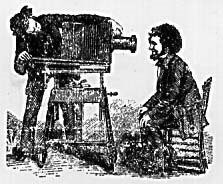In the introduction to Cultural Studies in America by Jessica Munns and Gita Rajan, American studies is roughly defined as “the emergence of interdisciplinary studies engaged in understanding the genesis and development of the national culture through a study of ‘great’ works and movements.” Simply put, a large part of American culture studies is built upon prominent literary works and the contributions of writers such as Emerson, Thoreau, Whitman, and Twain. The study of American culture and history must also include pertinent social advancements, like the women’s movement and the civil rights movement. The text explains that “…by moving history, to some extent, from background to context, by looking at popular as well as canonical works, by insisting on an interdisciplinary approach, and by raising questions of method, the Americanists made a vital contribution to the scholarly study of culture.”
1) An important key word to note when reading this introduction is media. The concept of mass media and the influence that it has on popular culture and opinion is interwoven throughout this text. It is cited by Munns and Rajan that “each communications medium- the print word of the Gutenberg era or the electronic media of the present age- alters beyond out recognition our ways of thinking and perceiving.” In New Keywords by Bennett et al, mass media “constitute powerful one-way systems for communication from the few to the many... The critical tradition, under the influence of Marxism, has often been concerned with the question of the media’s role as an agent of powerful groups (political or commercial, elites or classes), purveying ideologies which may conceal the reality of structures of inequality from those who are most disadvantaged by them.” For the full definition of media, see New Keywords 211-214 p.
2) The American civil rights movement was cited alongside the women’s movement as being an important contributor to the construction of patterns of domination and subordination in America. The Wikipedia article about the civil rights movement provides adequate information about this movement and would be good to gloss over before reading the introduction to American cultural studies.
http://en.wikipedia.org/wiki/American_Civil_Rights_Movement_%281955-1968%29
3) This website offers a word bank of key terms found in the book, Keywords for American Cultural Studies edited by Bruce Burgett and Glenn Hendler. Clicking any of the words in the word bank will bring up a short definition and/or excerpt from a literary source containing that word.
http://keywords.nyupress.org/

No comments:
Post a Comment